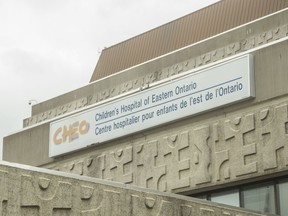CHEO forced to cancel surgeries to cope with 'perfect storm' of severe viral season - Ottawa Citizen
Admissions for children with RSV at CHEO are, on average, ten times higher now than they were prior to the pandemic

Article content
Record-high levels of the RSV illness plus new cases of COVID-19 and the flu are all driving an unprecedented surge in demand at CHEO that has forced the hospital to cancel some heart, brain and spinal surgeries and is leaving families waiting 15 hours or more in its emergency department.
Advertisement 2
Article content
"CHEO was not built for this demand," said President and CEO Alex Munter.
Article content
A recent surge in respiratory syncytial virus (RSV), in particular, is pushing demand for care at CHEO to levels never seen before and hospital officials don't expect the pressure to let up as colder weather approaches.
RSV is hitting children harder than usual this year across North America, overwhelming some hospitals. The common virus causes respiratory infections in adults and children but disproportionately affects kids, especially those under two years of age, said CHEO's chief of infectious diseases, immunology and allergy, Dr. Chuck Hui.
On Wednesday, Munter, along with infectious disease and emergency medicine specialists, held a video press briefing to talk about the situation and to advise parents on when they should seek medical care for RSV and other viral infections and when they can care for them at home.
Advertisement 3
Article content
Munter said the hospital is very concerned that some scheduled surgeries are being canceled and is in talks with the province about further funding for intensive care to take some of the pressure off.
The hospital has also been redeploying staff into emergency, critical care and pediatric medicine. It is also employing nurse practitioners — paid for by hospital donors through the CHEO Foundation — to work in pre-triage in the emergency department, a tool that has helped reduce the number of people seeking care in emergency.
"Some families are quite happy not staying, after getting that support," said Munter.
RSV was the leading cause of infant hospitalizations prior to the pandemic. But now, it is infecting children at higher rates, based on hospital admissions and demand at emergency. That is, in part, because it declined dramatically during the pandemic and more children than usual have not been previously exposed, resulting in more severe cases.
Advertisement 4
Article content
Admissions for children with RSV at CHEO are, on average, ten times higher now than they were prior to the pandemic, said CHEO spokesperson Patrick Moore.
"It is like the perfect storm, the combination of a large susceptible cohort of kids in combination with behavioural factors (such as the return to school)," said pediatrician and infectious disease specialist Dr. Anne Pham-Huy.
In addition to RSV, which has arrived earlier this year than it typically does, CHEO is seeing rising hospitalizations for COVID and has admitted two children with influenza, something that is rare in October.
CHEO had the busiest months in its history during May, June, July and September and is seeing 12 per cent more children coming to emergency with viral illnesses this October than a year ago. Earlier this fall, it advised families to bring blankets, snacks and toys with them when they come to emergency because of the long waits.
Advertisement 5
Article content
Munter said pressure on the emergency department is a combination of the multiple, severe viruses that are circulating as well as "fewer care options" for families.
On Tuesday, the hospital's pediatric medicine units were at 134 per cent occupancy, the pediatric ICU was at 124 per cent occupancy and the emergency department, which was built for 150 visits a day, had 254 visits.
"As emergency physicians, we are definitely feeling this wave," said Dr. Melissa Langevin, the hospital's medical director of emergency medicine.
She advised parents to care for children with RSV and other viruses at home, when they can, by manually removing mucus from their nose so they can breathe and drink liquids, which are crucial. Children under two months old with a fever should be seen by a doctor, in addition to children who are having severe difficulty breathing or pauses in breathing in young children. Very young children drinking half of what they normally do should also receive medical attention, she said.
Langevin said RSV usually gets worse before it gets better and lasts more than a week. Persistent coughing is sometimes common, she said, in children who finish one infection and get another one. She recommended honey for children over the age of one and noted that the Canadian Pediatric Society does not recommend cough syrup for children.
-

Book your flu shot ASAP, Ottawa Public Health says as it launches fall campaign
-

It saves lives, but ECMO therapy used in COVID-19 treatment can lead to higher mental health diagnoses


Comments
Post a Comment